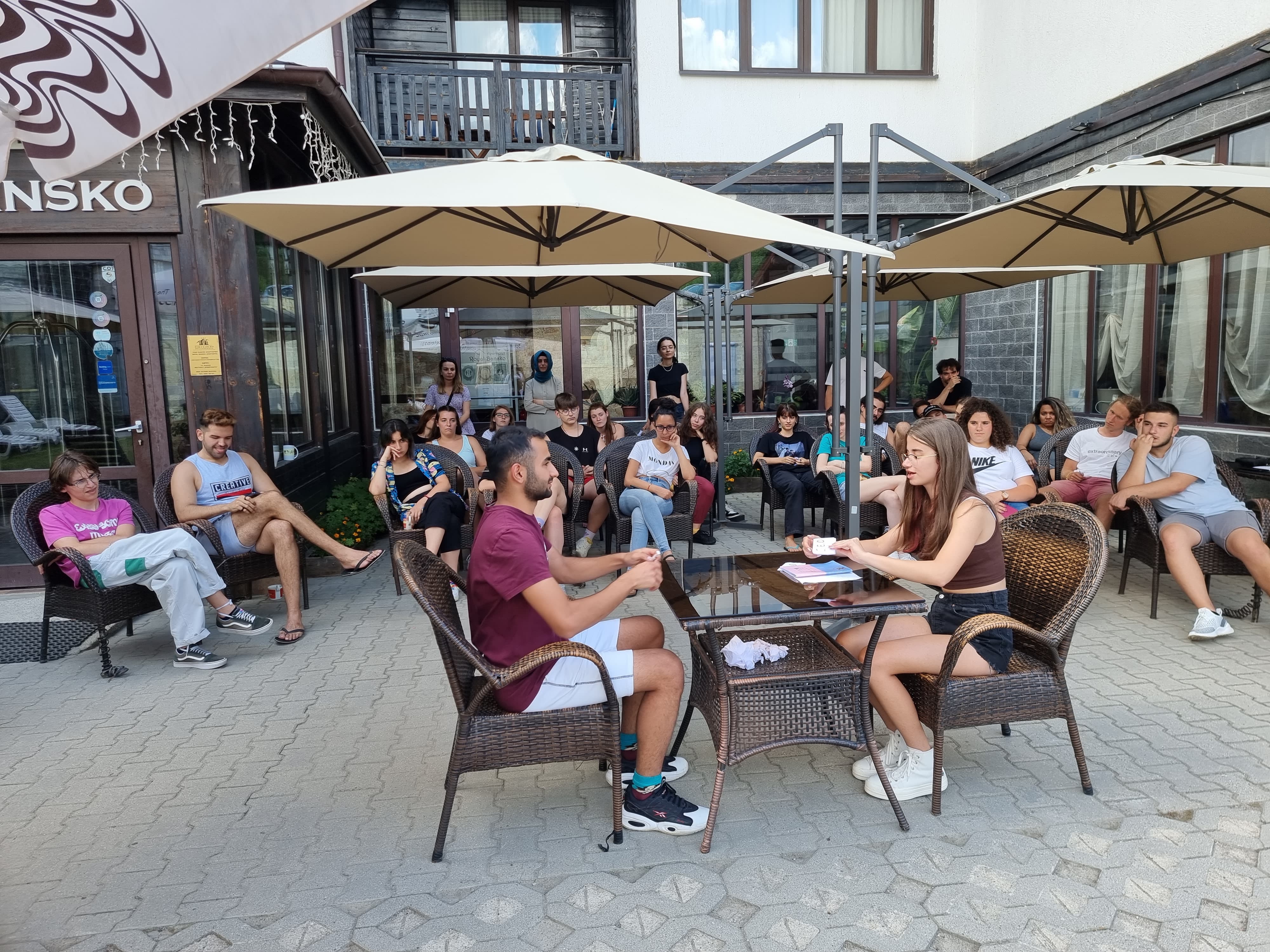As follow up activity, the participants created several articles which we are happy to publish:
Every day the issue of human rights becomes more relevant and discussed all over the world. This is due to the increase of various negative acts aimed at certain groups of people and the (variety of) means of their implementation. We had the opportunity to analyze the current situation regarding hate speech in several countries such as Bulgaria, Romania, Hungary, Italy, Spain and Turkey, and this article will highlight the current state of affairs as far as the legal and legislative status of hate speech is concerned.
Firstly, hate speech is defined as the denigration of the reputation of a social group stereotyped on any particular national, racial or religious basis, accompanied by incitement to hostility, violence and discrimination against that group. The European Union is actively opposed to any form of hate speech and tries to reduce or altogether prevent its appearance in everyday life. But, unfortunately, nowadays what people would not dare to say in person when meeting other people, they will easily spread on the Internet, because they understand that this is not subject to full control of the law.
Moreover, freedom of speech is undoubtedly one of the most important principles supporting democracy at the domestic and international levels. Allowing people to say what they want, especially to criticize established authorities, is itself a fundamental guarantee of everyone’s rights. The mission of the European Union should be not prohibiting freedom of speech but rather to foster an understanding of the permissible limits in which a civil discourse can be had about complex and sensitive issues. As such we will be able to understand that states are bound by certain limits and have no right to restrict hate speech without restricting freedom of speech. There is an article on certain types of public speech which, following Article 20 of the ICCPR, asks all states to prohibit by law any advocacy of national, racial or religious hatred that constitutes incitement to discrimination, hostility or violence. Ultimately, the suppression of hate speech appears necessary to create a social and cultural climate conducive to the realization of basic principles of international human rights, such as the fight against racism and discrimination in general. Countering the spread of hate speech can contribute to a fruitful intercultural dialogue that respects differences but can also create shared values. The following part will outline the legal and legislative status quo of various European countries as far as hate speech is concerned:
- Romania
A legal definition of hate speech does not exist. However, experts in the field have attempted to define it as “any speech, gesture or conduct, writing, or display which is forbidden because it may incite violence or prejudicial action against or by a protected individual or group, or because it disparages or intimidates a protected individual or group”. The situation in Romania is rather unpromising. There is only one law which targets one form of hate speech, antisemitism. It is a relatively new law that has just been adopted that makes any public manifestation of antisemitism punishable by prison (Law 157/2018). As for other forms of hate speech which might be oriented towards women, minorities, youngsters, LGBTQ+ communities remain uncriminilized because people do not take it seriously.
- Italy
Although Italy does not have an agreed legal definition of hate speech, Article 3 of Law 654/1975 provides a general definition by describing it as “crime of propaganda of ideas based on ethnic or racial hatred” and “violence or instigation to violence for racial, ethnic, national or religious reasons”. Article 13 has again modified the penalties specifically providing the choice of financial or imprisonment penalties as alternatives, i.e. the judge can decide to apply either a penalty of imprisonment up to one year and six months or a fine up to 6,000 Euros. Furthermore, the change introduced by Law 85/2006 was only the decrease of penalty, without any modification to the type of conduct prohibited.
- Spain
There is no specific definition of hate crime or hate speech in the Spanish legal system; therefore, the terms are not used in legislation. When prosecutors and judges refer to these issues, they usually resort the working definition employed by the OSCE/ODHIR. However, in Spain there is currently a doctrinal debate, in which many actors prioritize the right to freedom of expression.
In addition, the Spanish legal framework does not provide any specific provision on hate speech law as such. Hate speech cases are processed indirectly under discrimination law provisions if the “speech” represents a form of discrimination or those types of acts that different law provisions penalize, depending on the type of offence produced by the act itself (e.g. instigation to violence).
- Turkey
Hate crimes are quite prevalent in Turkey. And, unfortunately, problematic areas in legislation on hate crimes are quite expansive in the country. There are, first of all, serious legal loopholes as there are no extensive legal regulations on hate crimes. The current legislation on hate speech, moreover, is not implemented to prevent hate speech. Another important problem pertains to the fact that hate speech and hate crimes have not been prescribed under a single title. Turkey had signed Protocol No. 12 to the ECHR that prescribes prohibition of discrimination on 18 April 2001 but the protocol has not gone into force yet because it has not been ratified by the parliament. The ratification of this protocol is of vital significance for combatting racism and racial discrimination.
- Hungary
During the last few years, ‘hate speech’ against disadvantaged groups, in particular the Roma, Jews, LGBTQI people, migrants, and asylum seekers, has been an issue of growing concern in Hungary. The rise of prejudice and intolerance in Hungarian society can be closely linked to the Hungarian government’s own policies and communications strategies, as well as the lack of political will to deal with instances of hate crime and ‘hate speech’. In recent years, the government has run public campaigns against refugees, migrants, and, more recently, against non-governmental organisations (NGOs) and George Soros, a Hungarian-American businessman and philanthropist. This has created a forum for the rise of ‘hate speech’ and facilitated its legitimation in Hungarian public discourse. Under the media law, the Hungarian Media Council (the Media Council) has the authority to investigate cases of infringement, both ex officio and in response to complaints in ‘hate speech’ cases and impose administrative sanctions. Since its creation in 2011, the Media Council has examined only a few cases of ‘hate speech’; again, this is due to the strict test applied by the Media Council in the respective cases. Moreover, the Media Council does not have oversight powers over public service media and other state-controlled media, which have broadcast problematic governmental campaigns.
- Bulgaria
A hate crime is a criminal offence in Bulgaria, and perpetrators receive stricter punishments than those who commit a regular crime. Punishment includes imprisonment from 1 to 4 years, a fine of 5,000 to 10,000 leva, and a public announcement of the crime in the local newspaper or municipality website. Using media to disseminate or to provoke discrimination, violence or hatred on the grounds of race, nationality or ethnic origin, is also a crime. If there is enough information to determine that you were the victim of a hate crime, the prosecutor will start a criminal procedure. During this procedure, the police and the prosecutor will conduct an investigation, collect more evidence, question the witnesses, the suspected perpetrator and the victim. However, the prosecutor may refuse to start a criminal procedure if they determine that your experience wasn’t a hate crime. In this case, they will inform you about the refusal and you can submit an appeal to the higher prosecutor. There is no time limit for submitting this appeal. The court can forbid the accused perpetrator to approach you, make any contact with you, and visit certain areas where you live or visit. For this to happen, you as a victim or the prosecutor with your consent can require the court to issue safety measures. The court will immediately examine this request.
You can access these rights only if you explicitly request to participate in the criminal procedure and indicate an address for receiving notifications.

